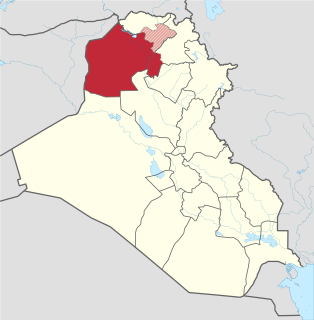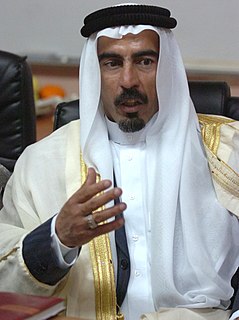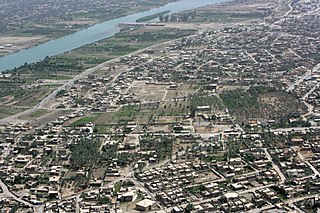
Nineveh Governorate is a governorate in northern Iraq that contains the ancient Assyrian city of Nineveh. It was an integral part of Assyria from the 25th century BC to the 7th century AD. It has an area of 37,323 km2 (14,410 sq mi) and an estimated population of 2,453,000 people in 2003. Its chief city and provincial capital is Mosul, which lies across the Tigris river from the ruins of ancient Nineveh. Tal Afar is the second-biggest city. Before 1976, it was called Mosul Province and included the present-day Dohuk Governorate, which is now part of the autonomous Iraqi Kurdistan.

Al Anbar Governorate, or Anbar Province, is the largest governorate in Iraq by area. Encompassing much of the country's western territory, it shares borders with Syria, Jordan, and Saudi Arabia. The provincial capital is Ramadi; other important cities include Fallujah and Haditha.

Abdul Sattar Abu Risha – Sheikh Abdul Sattar Eftikhan al-Rishawi الشيخ عبد الستار افتيخان الريشاوي – was a high-profile Iraqi tribal sheikh of the Abu-Risha tribe. He was the leader of an alliance of Iraqi Sunni Arab tribes that opposed al-Qaeda in Iraq.
Anbar Salvation Council is a collection of tribal militias in the Al Anbar province of Iraq, formed by former Ba'athists and nationalists to fight al-Qaeda in Iraq and other associated terrorist groups. In Arabic the council is known as Sahawa Al Anbar, abbreviated SAA when referred to by the US Army. The council has become a model for awakening movements across Iraq, though the Iraqi Defense Ministry has said that it plans to disband the Awakening groups due to concerns about their origins and future intent.
The Sons of Iraq were coalitions between tribal Sheikhs in the Al Anbar province in Iraq as well as former Saddam Hussein's Iraqi military officers that united to maintain stability in their communities. They were initially sponsored by the US military.
Sheikh Faisal Raikan al-Gut al-Nimrawi, also known as Fasal al Gaood, was a Governor of Anbar, Iraq and an important Iraqi Sunni Muslim ally of the United States. He served as interim governor of the province from July 2004 to January 2005.

Tanzim Qaidat al-Jihad fi Bilad al-Rafidayn or TQJBR, also referred to as Al-Qaeda in Iraq, AQI, or Al-Qaeda in Mesopotamia) is an Iraqi Sunni Islamic Jihadist organization affiliated with al-Qaeda, for part of the first two decades of the 21st century.

Governorate or provincial elections were held in Iraq on 31 January 2009, to replace the local councils in fourteen of the eighteen governorates of Iraq that were elected in the 2005 Iraqi governorate elections. 14,431 candidates, including 3,912 women, contested 440 seats. The candidates came from over 400 parties, 75% of which were newly formed.

Maamoon Sami Rasheed al-Alwani is a former governor of Iraq's Al Anbar province. He was appointed by the Anbar Provincial Council in May 2005, following the murder of the previous governor, Raja Nawaf Farhan al-Mahalawi. He is a member of the Abu Alwani clan, part of the Dulaim tribe. His name was found along with the names of other prominent Iraqi Sunni leaders who had been targeted for assassination in a captured al-Qaida in Iraq (AQI) document.

The Iraq War in Al Anbar Governorate, also known as the Al Anbar campaign, consisted of fighting between the United States military, together with Iraqi Government forces, and Sunni insurgents in the western Iraqi governorate of Al Anbar. The Iraq War lasted from 2003 to 2011, but the majority of the fighting and counterinsurgency campaign in Anbar took place between April 2004 and September 2007. Although the fighting initially featured heavy urban warfare primarily between insurgents and U.S. Marines, insurgents in later years focused on ambushing the American and Iraqi security forces with improvised explosive devices (IED's), large scale attacks on combat outposts, and car bombings. Almost 9,000 Iraqis and 1,335 Americans were killed in the campaign, many in the Euphrates River Valley and the Sunni Triangle around the cities of Fallujah and Ramadi.
The National Front for the Salvation of Iraq is a political party in Iraq. It developed out of the Awakening movements and is mostly made up of Sunni Muslim tribal leaders from Al-Anbar province, an ethnic Arab region.
The Al Anbar Governorate election of 2009 was held on 31 January 2009 alongside elections for all other governorates outside Iraqi Kurdistan and Kirkuk.

Operation al-Shabah was launched in May 2013 by the Iraqi Army, with the stated aim of severing contact between the Islamic State of Iraq and the Levant and the al-Nusra Front in Syria by clearing militants from the border area with Syria and Jordan.

The Islamic State of Iraq was a militant Salafist jihadist group that aimed to establish an Islamic state in Sunni, Arab-majority areas of Iraq during the Iraq War and later in Syria during the Syrian Civil War.
Raja Nawaf Farhan al-Mahalawi was the Governor of Iraq's Al Anbar province, serving from January 2005 until his death in May 2005.
Abdul Karim Burjas al-Rawi was the first post-invasion Governor of Iraq's Al Anbar province, serving until July 2004, when he resigned.

Beginning in December 2012, Sunnis in Iraq protested against the Maliki government. On 28 December 2013, a Sunni MP named Ahmed al-Alwani was arrested in a raid on his home in Ramadi. Alwani was a prominent supporter of the anti-government protests. This incident led to violence in Al Anbar Governorate between the Iraqi Army and a loose alliance of tribal militias and other groups fighting alongside the Islamic State in Iraq and the Levant (ISIL).

The Battle of Ramadi (2014–15), also called the Fall of Ramadi or Battle of Abu Muhannad Al Sweidawi , was part of an ISIL offensive to capture all of the Anbar Province. Ramadi was one of the Iraqi government's last strongholds in Anbar, after ISIL's success in a previous campaign. The battle began in October 2014, and drew to a close on 14 May 2015, as Islamic State of Iraq and the Levant (ISIL) insurgents seized hold of government buildings. On 17 May, the Iraqi Army and special forces fled the city, with 500 civilians and security personnel dead.

The Al-Karmah offensive (2015), named Fajr al-Karma, was an offensive launched by the Iraqi Army and anti-ISIL Sunni tribal fighters to recapture the Al-Karmah district taken by the Islamic State of Iraq and the Levant in Iraq. The offensive began on 14 April 2015. During the offensive the anti-ISIL forces captured part of the city of Al-Karmah, and the old road of Al-Karmah.
Suhaib al-Rawi is an Iraqi politician and the former Governor of Anbar until August 2017. He is a member of the Iraqi Islamic Party.












